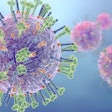
The presence of blood clots may help explain cognitive problems such as "brain fog" in patients following COVID-19 infection, say researchers.
An Oxford University-led study found that high levels of two proteins involved in blood clotting were linked to persistent problems patients had with thinking, concentration, and memory, six and 12 months after COVID-19 hospitalization.
The researchers wrote in Nature Medicine that the associations with blood biomarkers might be “validating” for patients who report brain fog. The findings could also lead to the development of predictive models that assess individuals who are at risk of post-COVID cognitive impairments and possible treatments with anticoagulants.
Many people develop neuropsychiatric symptoms in the weeks and months after SARS-CoV-2 infection, in isolation or within a post-acute COVID-19 syndrome also known as long COVID. Cognitive deficits, including brain fog, are common, but little is known about how they develop.
The researchers analyzed blood tests from 1,837 adults hospitalized with COVID-19. They looked for patterns of association between biomarkers measured on admission to the hospital for COVID-19 and post-acute cognitive deficits (measured six and 12 months later).
Both objective and subjective cognitive deficits, as well as occupational impacts (for example, the ability to work), were measured. The researchers identified two separate profiles of biomarkers. High levels of the protein fibrinogen in patients were linked with both objective and subjective cognitive deficits; high levels of D-dimer, a protein fragment, were linked with subjective cognitive deficits and occupational outcomes. Patients with high D-dimer levels also complained of fatigue and shortness of breath. The associations could not be accounted for simply by more severe illness nor by preexisting cognitive deficits.
“Both fibrinogen and D-dimer are involved in blood clotting, and so the results support the hypothesis that blood clots are a cause of post-COVID cognitive problems,” co-author Dr. Max Taquet of Oxford University's Department of Psychiatry said in a statement.
“Fibrinogen may be directly acting on the brain and its blood vessels, whereas D-dimer often reflects blood clots in the lungs and the problems in the brain might be due to lack of oxygen," Taquet added.
The biomarker associations highlight the importance for clinicians “to avoid inferring that subjective deficits in the absence of objective signs are insignificant and cannot have a biological underpinning,” wrote the researchers.
They noted that brain imaging in people with post-COVID cognitive deficits might show whether there is evidence of cerebral ischemia and, if so, “evaluation of anticoagulants during the acute illness in a population at risk might be worthwhile.”
The study was funded by the MQ Mental Health Research and Wolfson Foundation. The patients involved were part of the PHOSP-COVID (Post-hospitalisation COVID-19) study based at the University of Leicester.
“Large, detailed studies such as PHOSP are vital if we’re to understand the different ongoing, and often debilitating, symptoms that people are continuing to experience post-COVID,” said Dr. Rachael Evans, an associate professor in the department of respiratory sciences at the University of Leicester.



















